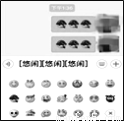��Ŀ����
I my father very much. I haven't seen him for a month.
A. forget B. know C. miss D. wish
C �����������⣺�ҷdz������ҵĸ��ס���һ����û�������ˡ�A. forget���ǣ�B. know֪�����˽⣻C. miss������������D. wishϣ�����������ġ���һ����û�������ˡ�����֪�ǡ��ҷdz������ҵĸ��ס�����ѡC��
��ϰ��ϵ�д�
 �Ķ��쳵ϵ�д�
�Ķ��쳵ϵ�д�
�����Ŀ


